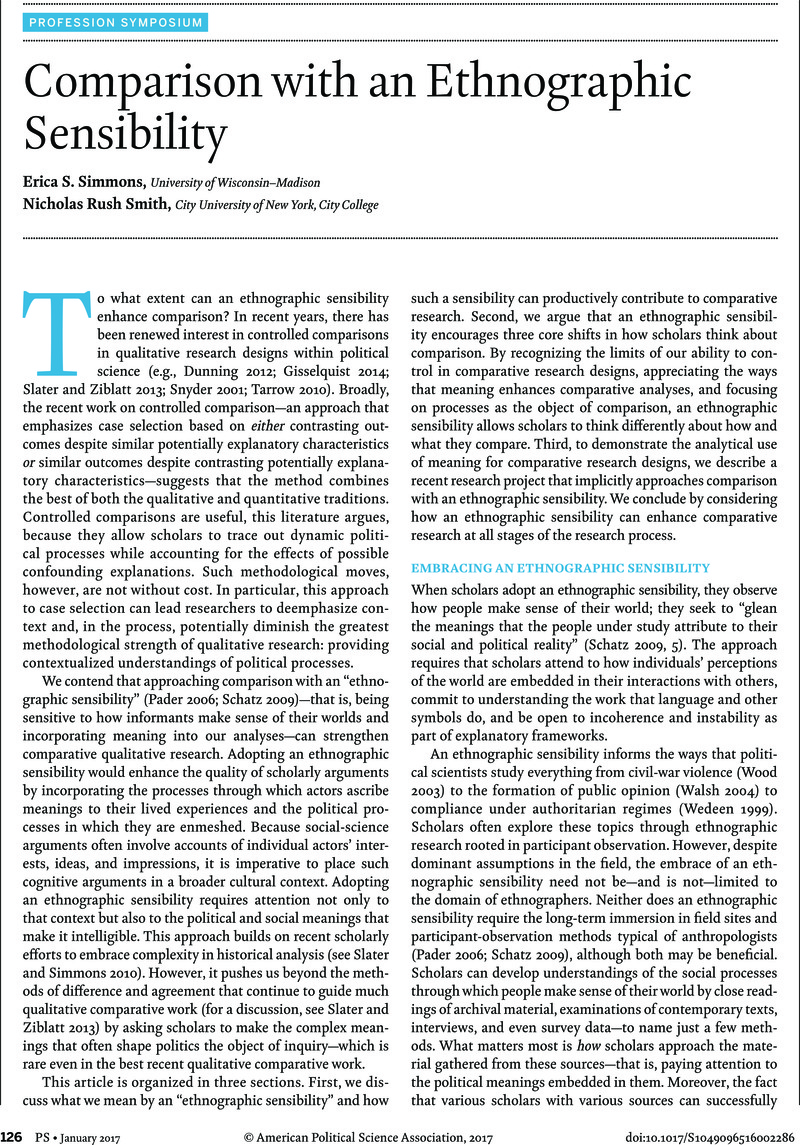Crossref Citations
This article has been cited by the following publications. This list is generated based on data provided by Crossref.
Cheesman, Nick
2018.
Rule-of-Law Ethnography.
Annual Review of Law and Social Science,
Vol. 14,
Issue. 1,
p.
167.
Ahmed, Amel
2019.
Multi-methodology research and democratization studies: intellectual bridges among islands of specialization.
Democratization,
Vol. 26,
Issue. 1,
p.
97.
Schwartz, Stephanie
2019.
Home, Again: Refugee Return and Post-Conflict Violence in Burundi.
International Security,
Vol. 44,
Issue. 2,
p.
110.
Michener, Jamila
2020.
Power from the Margins: Grassroots Mobilization and Urban Expansions of Civil Legal Rights.
Urban Affairs Review,
Vol. 56,
Issue. 5,
p.
1390.
Simmons, Erica S.
2021.
Targets, Grievances, and Social Movement Trajectories.
Comparative Political Studies,
Vol. 54,
Issue. 10,
p.
1818.
Fu, Diana
and
Simmons, Erica S.
2021.
Ethnographic Approaches to Contentious Politics: The What, How, and Why.
Comparative Political Studies,
Vol. 54,
Issue. 10,
p.
1695.
Krause, Jana
2021.
The ethics of ethnographic methods in conflict zones.
Journal of Peace Research,
Vol. 58,
Issue. 3,
p.
329.
Krasznai Kovacs, Eszter
2021.
Politics and the Environment in Eastern Europe.
Kokko, Anna Kristiina
and
Hirsto, Laura
2021.
From physical spaces to learning environments: processes in which physical spaces are transformed into learning environments.
Learning Environments Research,
Vol. 24,
Issue. 1,
p.
71.
Galindo-Ramírez, Joaquín
Jaraíz-Arroyo, Germán
and
Hernández-Ramírez, Macarena
2022.
Politician, activist… or hero?.
Journal of Language and Politics,
Vol. 21,
Issue. 5,
p.
721.
Vanhala, Lisa
Johansson, Angelica
and
Butler, Frances
2022.
Deploying an Ethnographic Sensibility to Understand Climate Change Governance: Hanging Out, Around, In, and Back.
Global Environmental Politics,
Vol. 22,
Issue. 2,
p.
180.
Otsuka, Kenji
2022.
Co‐optation in co‐production: Maintaining credibility and legitimacy in transboundary environmental governance in East Asia.
Review of Policy Research,
Vol. 39,
Issue. 6,
p.
771.
Parkinson, Sarah E.
2022.
(Dis)courtesy Bias: “Methodological Cognates,” Data Validity, and Ethics in Violence-Adjacent Research.
Comparative Political Studies,
Vol. 55,
Issue. 3,
p.
420.
Rhodes, R. A. W.
2022.
Core Executives in a Comparative Perspective.
p.
53.
Prinz, Janosch
2023.
Realism and real politics. The gap between promise and practice in Bernard Williams’ realism.
Critical Review of International Social and Political Philosophy,
Vol. 26,
Issue. 3,
p.
335.
Draudt-Véjares, Darcie
2023.
Multicultural at the Meso-Level: Governing Diversity within the Family in South Korea.
Pacific Affairs,
Vol. 96,
Issue. 4,
p.
701.
Cornwall, Andrea
Cordeiro, Silvia
and
Delgado, Nelson Giordano
2023.
Ethnographic Encounters: Using Ethnography to Study Brazil’s Participatory Governance Institutions.
Vibrant: Virtual Brazilian Anthropology,
Vol. 20,
Issue. ,
Wojciechowska, Marta
2023.
From lived urban experiences to cross-contextual theory: a selection dilemma.
Critical Review of International Social and Political Philosophy,
p.
1.
Geddes, Marc
and
Miller, Cherry
2024.
Interpreting parliaments, but how?: Centring parliamentary actors and settings in ethnographic design and practice.
The British Journal of Politics and International Relations,
Geddes, Marc
2024.
Comparing evidence use in parliaments: the interplay of beliefs, traditions, and practices in the UK and Germany.
Policy and Society,
Vol. 43,
Issue. 4,
p.
447.



